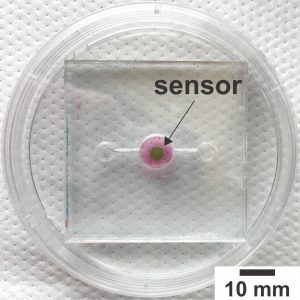A new biosensor has been developed that allows researchers to track oxygen levels in real time in “organ-on-a-chip” systems, according to North Carolina State University. The organ-on-a-chip makes it possible to ensure that bodily systems more closely mimic the function of real organs. The goal is to use these organs-on-a-chip to expedite drug testing and development by evaluating the effectiveness of new drugs with small-scale, biological structures that mimic a specific organ function, such as transferring oxygen from the air into the bloodstream in the same way that a lung does.
The new biosensor is an excellent tool for collecting data on oxygen levels, which is a big deal for researchers, as oxygen levels vary widely across the body. A healthy adult lung, for example, has an oxygen concentration of about 15 percent, while the inner lining of the intestine is around 0 percent. Because oxygen directly affects tissue functions, this means researchers can figure out if an organ is behaving normally based on oxygen levels – data provided by the organ-on-a-chip system.
“One of our next steps is to incorporate the biosensor into a system that automatically makes adjustments to maintain the desired oxygen concentration in the organ-on-a-chip,” says Michael Daniele, an assistant professor of electrical engineering at North Carolina State University and in the Joint Department of Biomedical Engineering at NC State and the University of North Carolina, Chapel Hill.
Scientists continue to make countless new advances in the biomedical field every day. Meetings such as the AiMES 2018 in Cancun, Mexico, offer researchers a platform to discuss their work and the latest biosensor developments, while also to providing academics a place to come together, collaborate, share results, and explore ideas. Join them this fall for your chance to experience it all first hand.


